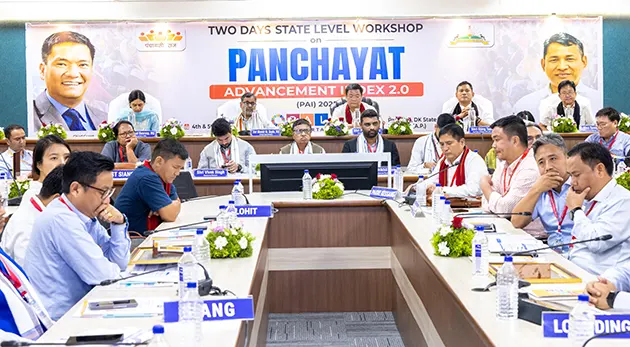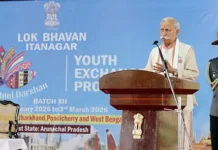ITANAGAR, 4 Aug: Chief Minister Pema Khandu said that the success of real-time evidence-based planning tools is crucial in the state, since Arunachal Pradesh remains largely rural.
Khandu said this after inaugurating a two-day state level workshop on the Panchayat Advancement Index (PAI) 2.0 at the DK Convention Centre here on Monday.
The workshop, aimed at strengthening evidence-based planning and decentralized governance, is being organized by the Panchayati Raj Department and the SIRD, in collaboration with the union Panchayati Raj Ministry and Pune (Maharashtra)-based YASHADA.
The Panchayat Advancement Index is a multi-domain and multi-sectoral index that is intended to be used to assess the overall holistic development, performance and progress of panchayats. It takes into account various socioeconomic indicators and parameters to gauge the wellbeing and development status of the local communities within the jurisdiction of a panchayat.
The CM highlighted the importance of PAI 2.0 as a scientific and data-driven framework introduced by the Panchayati Raj Ministry to assess development at the gram panchayat level. He emphasized that the index serves as a critical tool for bottom-up planning, helping identify local needs and progress on key rural development indicators.
Khandu acknowledged the formation of multi-tier committees at the state, district, and block levels for effective implementation and validation of PAI data. These include the State Level Steering Committee under the chief secretary, the State Data Validation Team under the PR Secretary, district monitoring committees under the deputy commissioners, and data validation teams under DPDOs and block-level officers.
Khandu reaffirmed the government’s commitment to decentralization, saying that 10% of the state’s own revenue is earmarked for panchayati raj institutions. The state has also institutionalized the SPICE (Sustainable, Participatory, Inclusive, Comprehensive Empowerment) model to empower grassroots democracy.
He further emphasized the need to align PAI 2.0 with the broader Sustainable Development Goals (SDGs) and the Localized SDG themes assigned to panchayats.
“Achieving SDG targets by 2030 requires robust local planning and coordination across departments,” he said.
Emphasizing the importance of continuous training and capacity building, Khandu termed it thebackbone for quality delivery of schemes and programmes at the grassroots level. He lauded the efforts of the SIRD&PR for having trained 15,819 personnel in the last financial year on thematic areas such as governance, planning, and implementation.
Addressing the deputy commissioners present from across the state, the chief minister stated that DCs play a pivotal role in grassroots development and service delivery. “The government has empowered DCs with significant administrative authority, including the power to suspend erring officers,” he said, and urged them to lead with dedication and integrity.
The chief minister congratulated the top-performing gram panchayats, circles, blocks, and districts who were felicitated at the event for their performance under PAI for the year 2022-2023. He stressed the importance of fostering healthy competition among local bodies to improve governance and to strive for national-level excellence.
He also commended the Panchayati Raj (PR) Department, led by PR Minister Ojing Tasing, the PR secretary, and the dedicated officials and resource persons from the MoPR, YASHADA, and the SIRD&PR for organizing the workshop.
Present on the occasion were Tasing, his adviser Tanya Soki, Chief Secretary Manish Kumar Gupta, PR Secretary Dr Sonal Swaroop, and resource persons from the Panchayati Raj Ministry and YASHADA.
Participants included all deputy commissioners, district panchayat development officers, district nodal officers, selected member secretaries, and gram panchayat chairpersons from across the state. (CM’s PR Cell)


